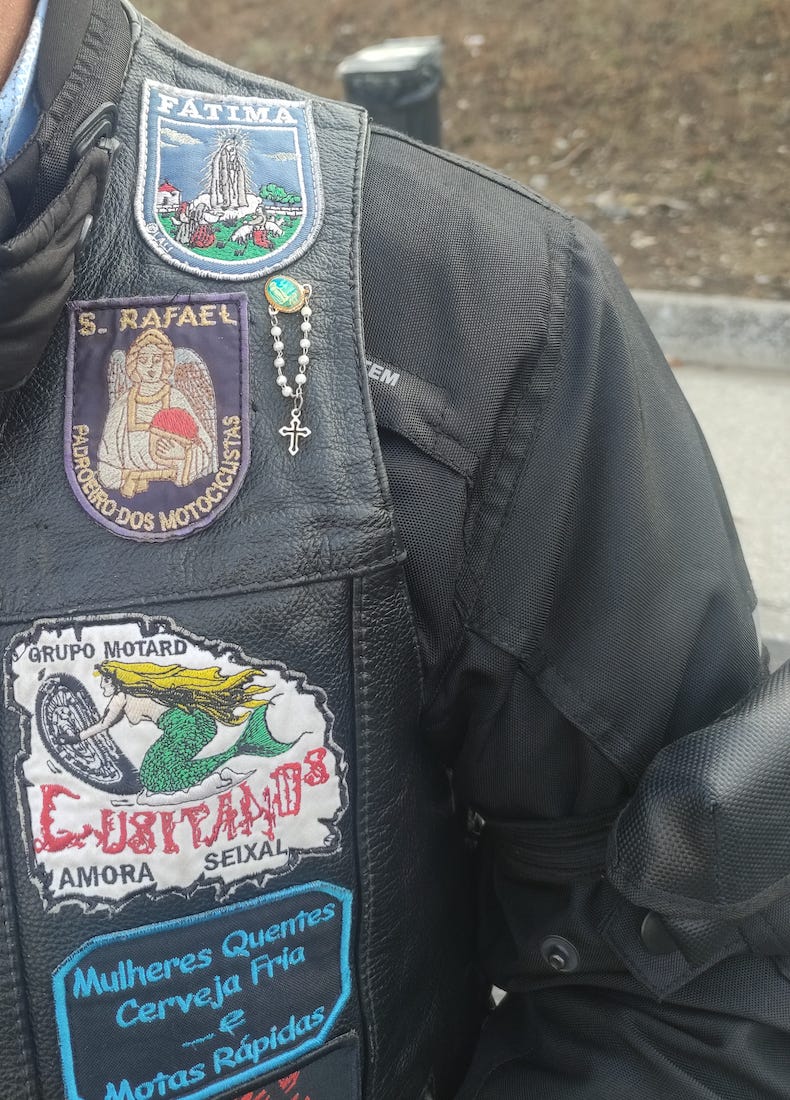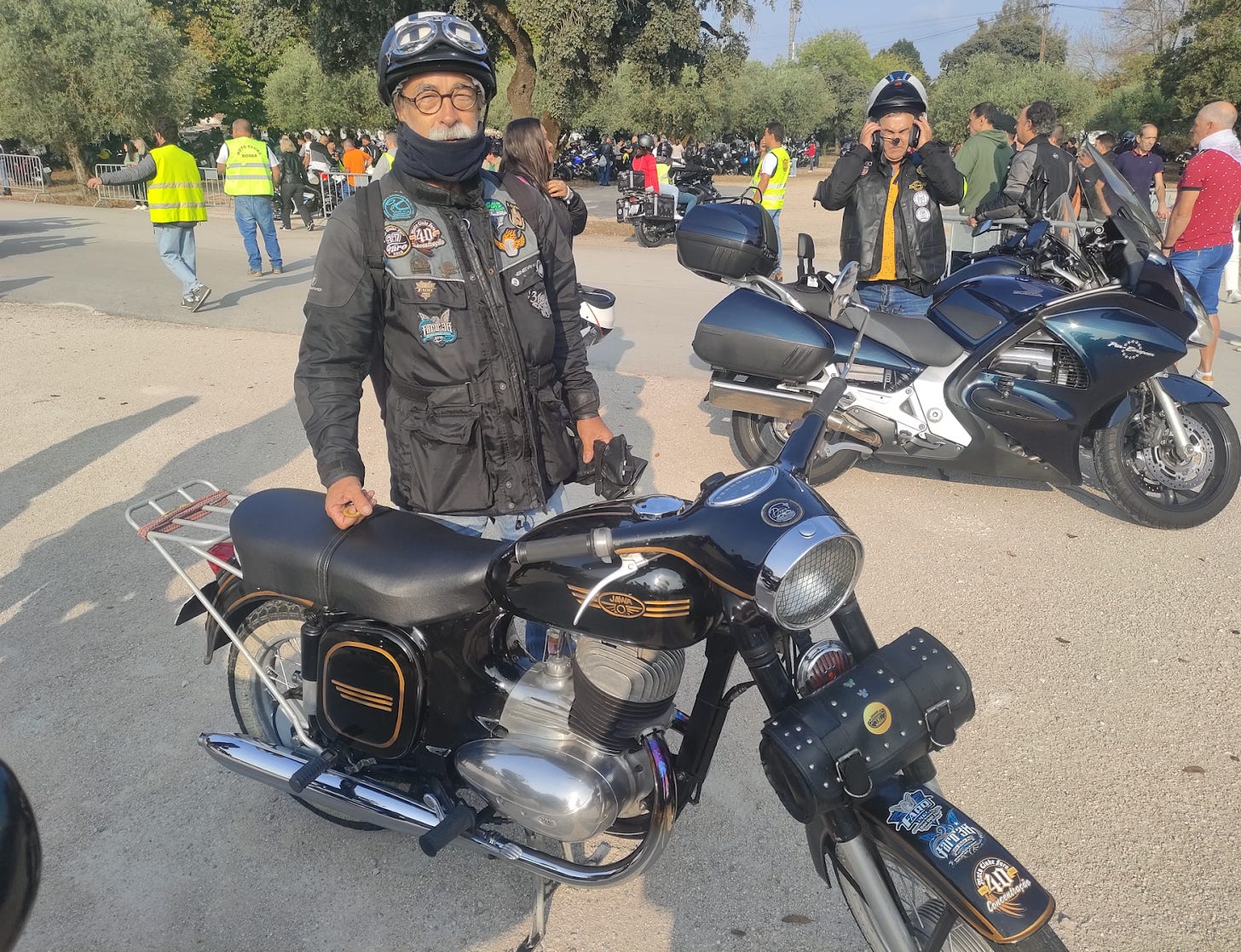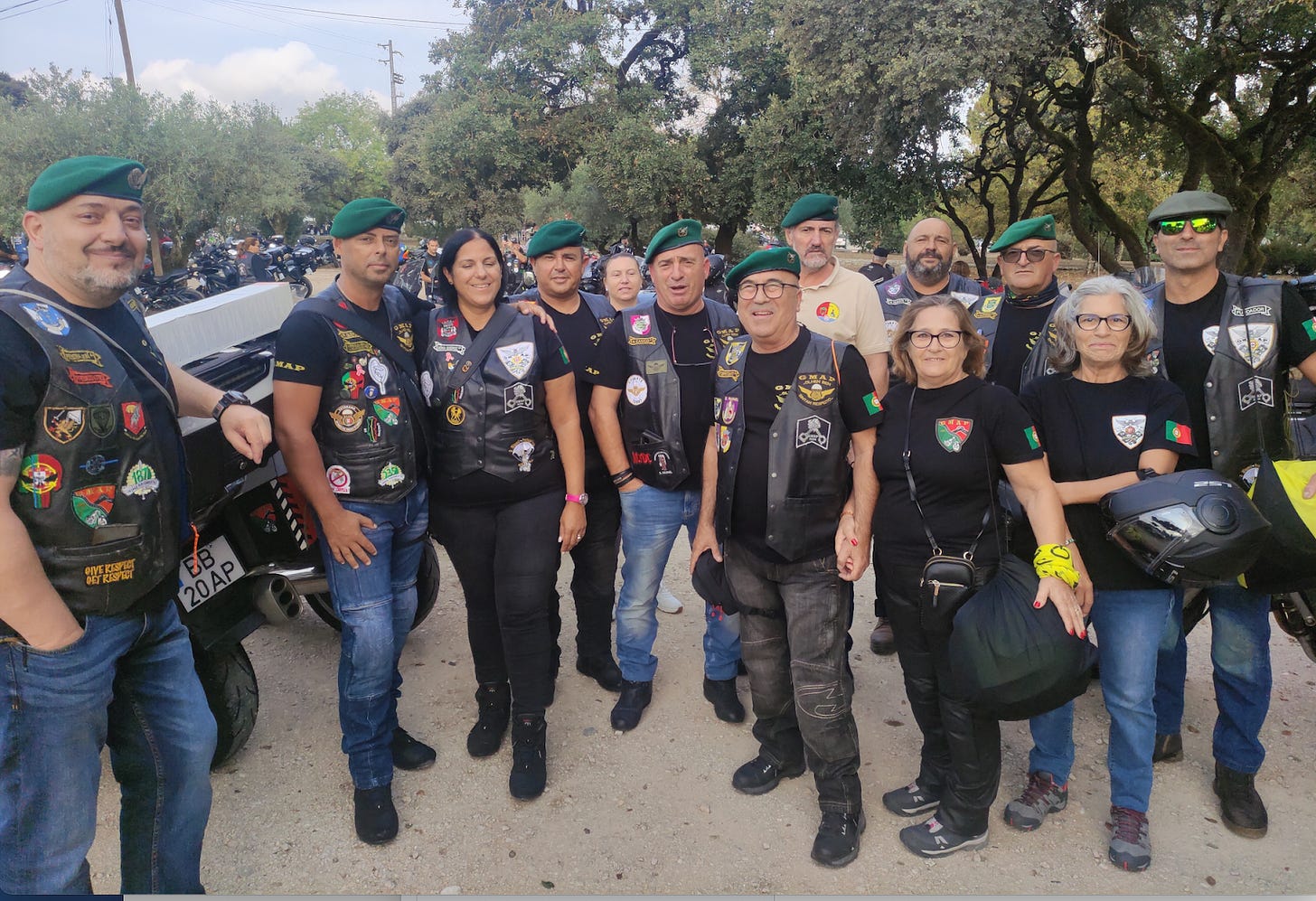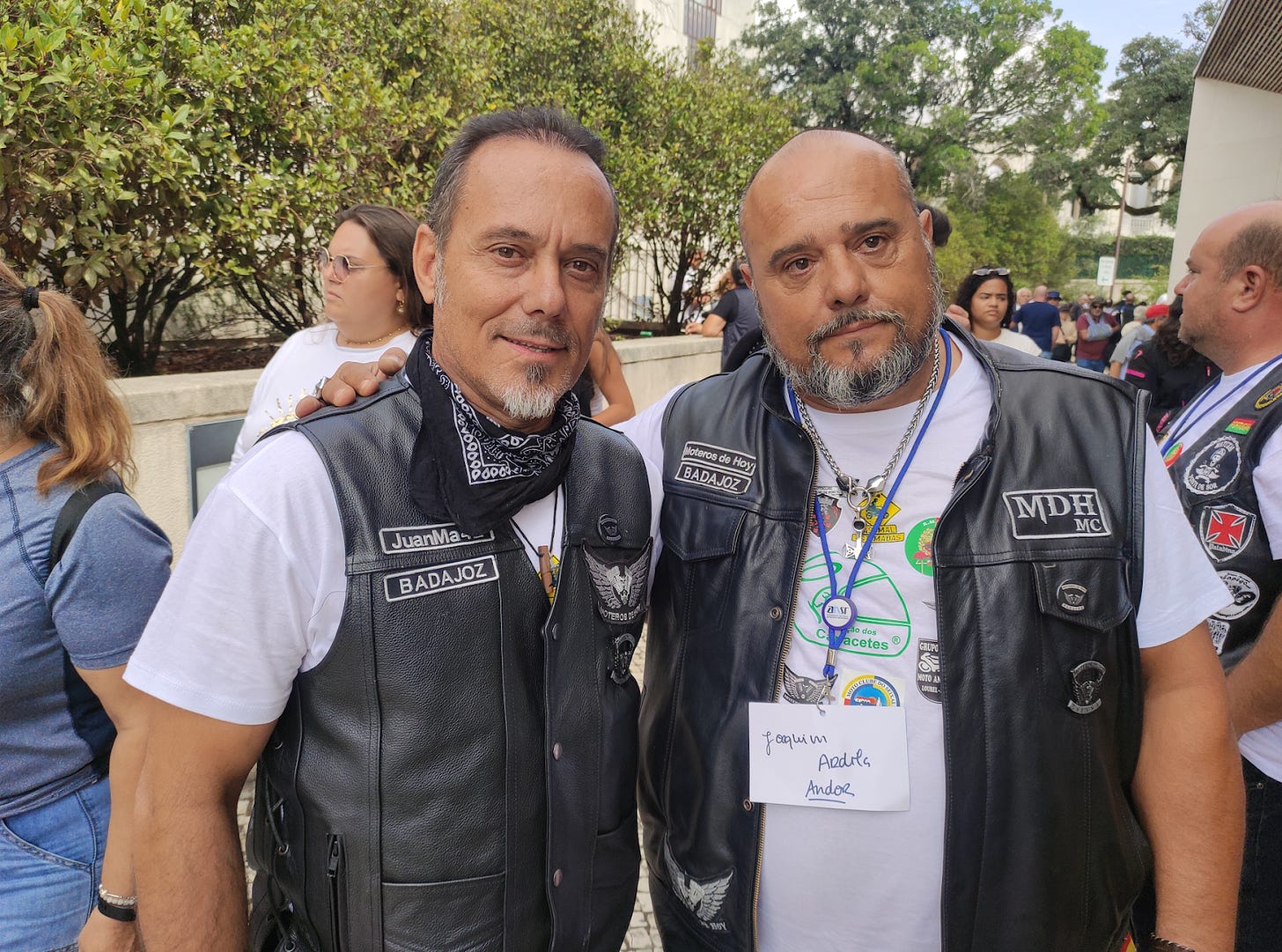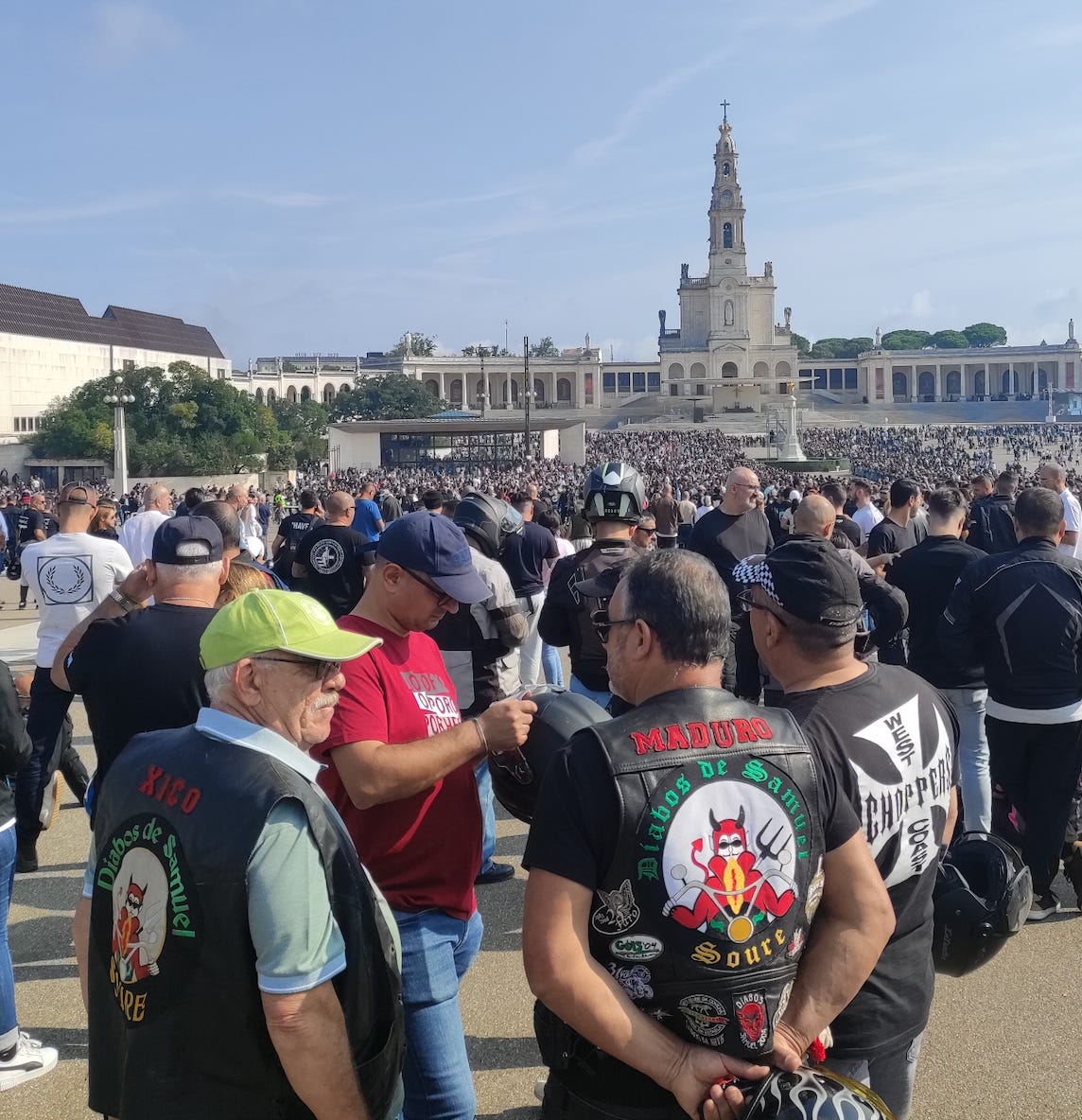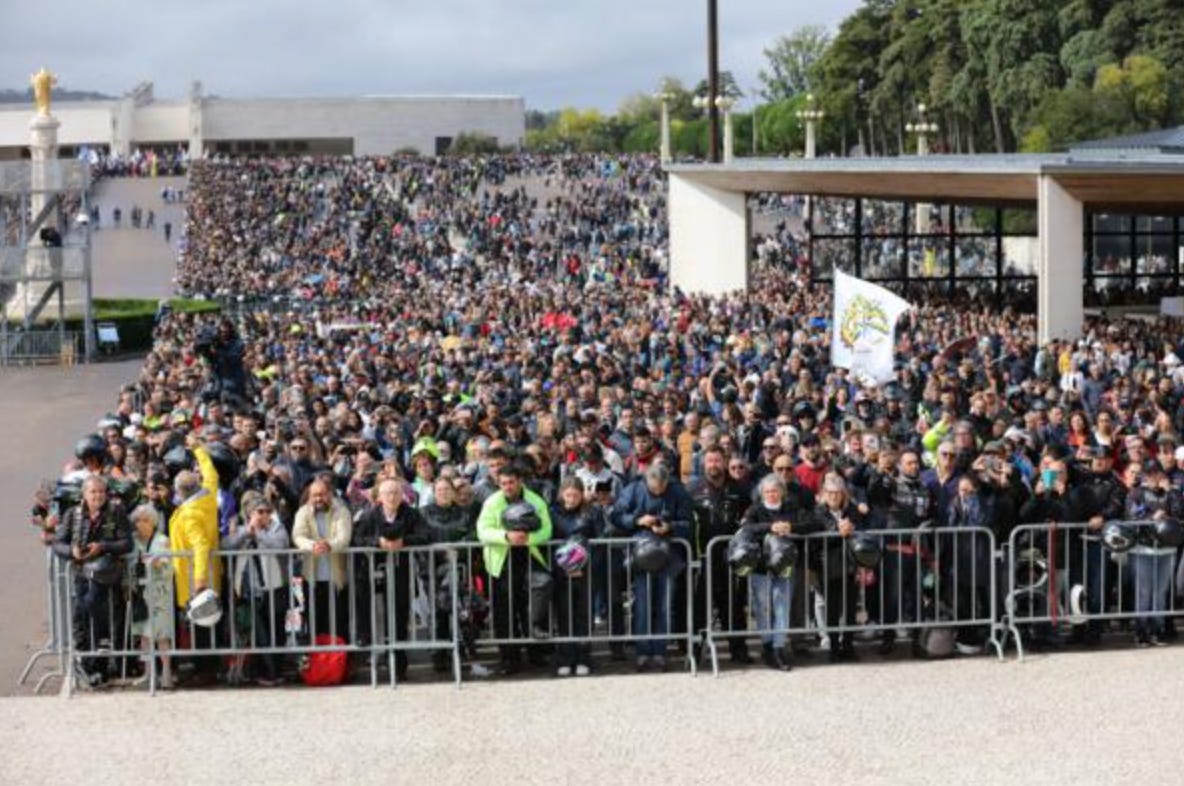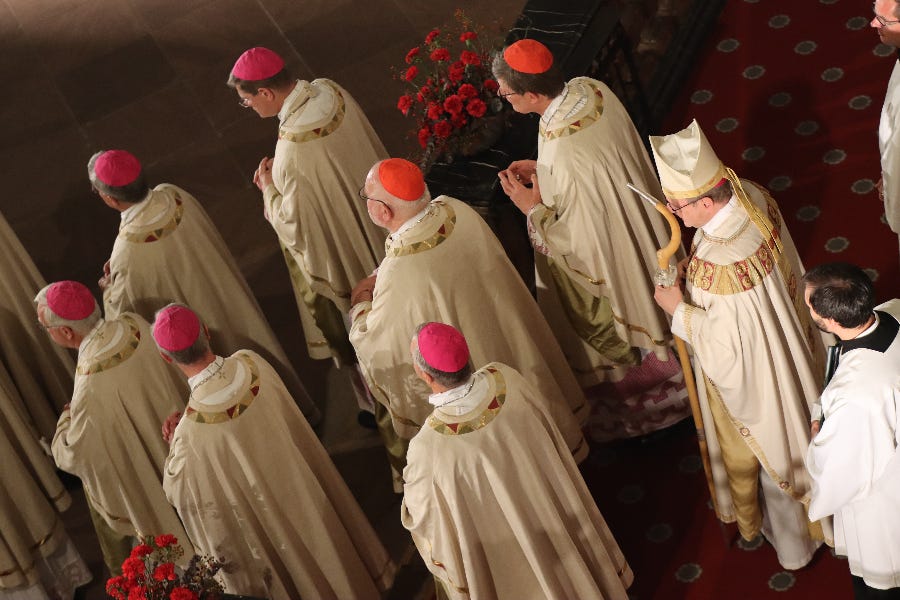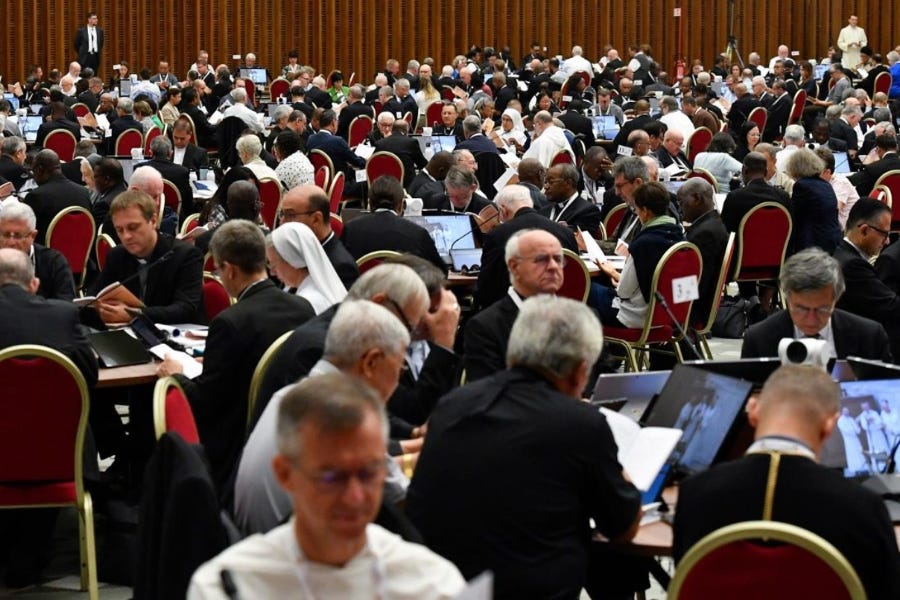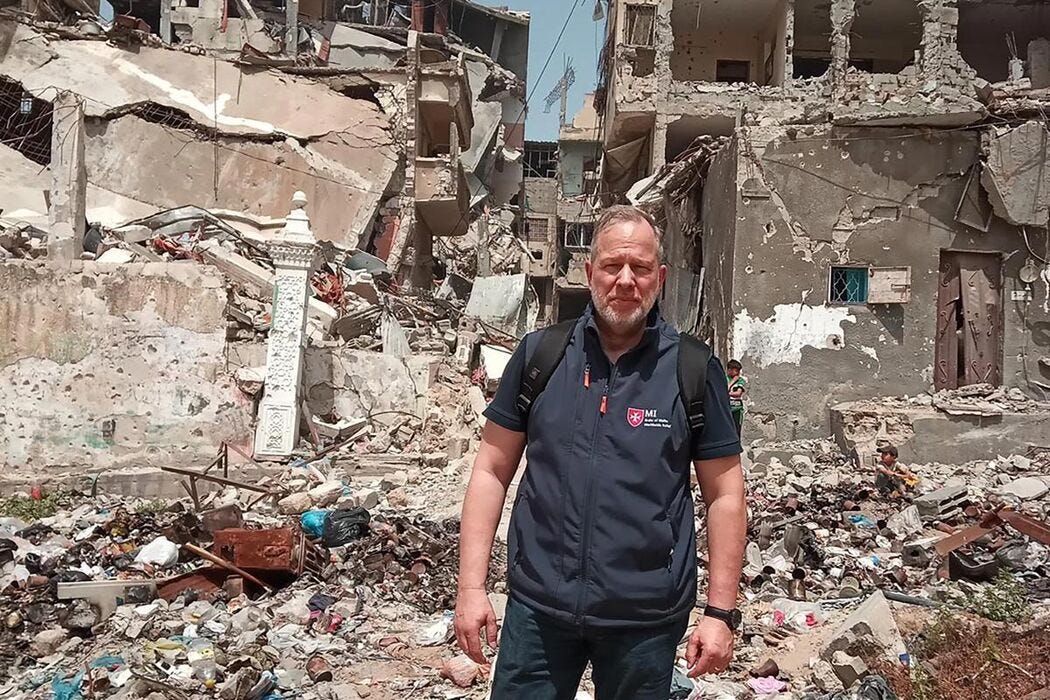It’s mid-morning in a small Portuguese town, and I am standing in a dirt parking lot, which is rapidly filling up with hundreds, and then thousands, of motorcycles.
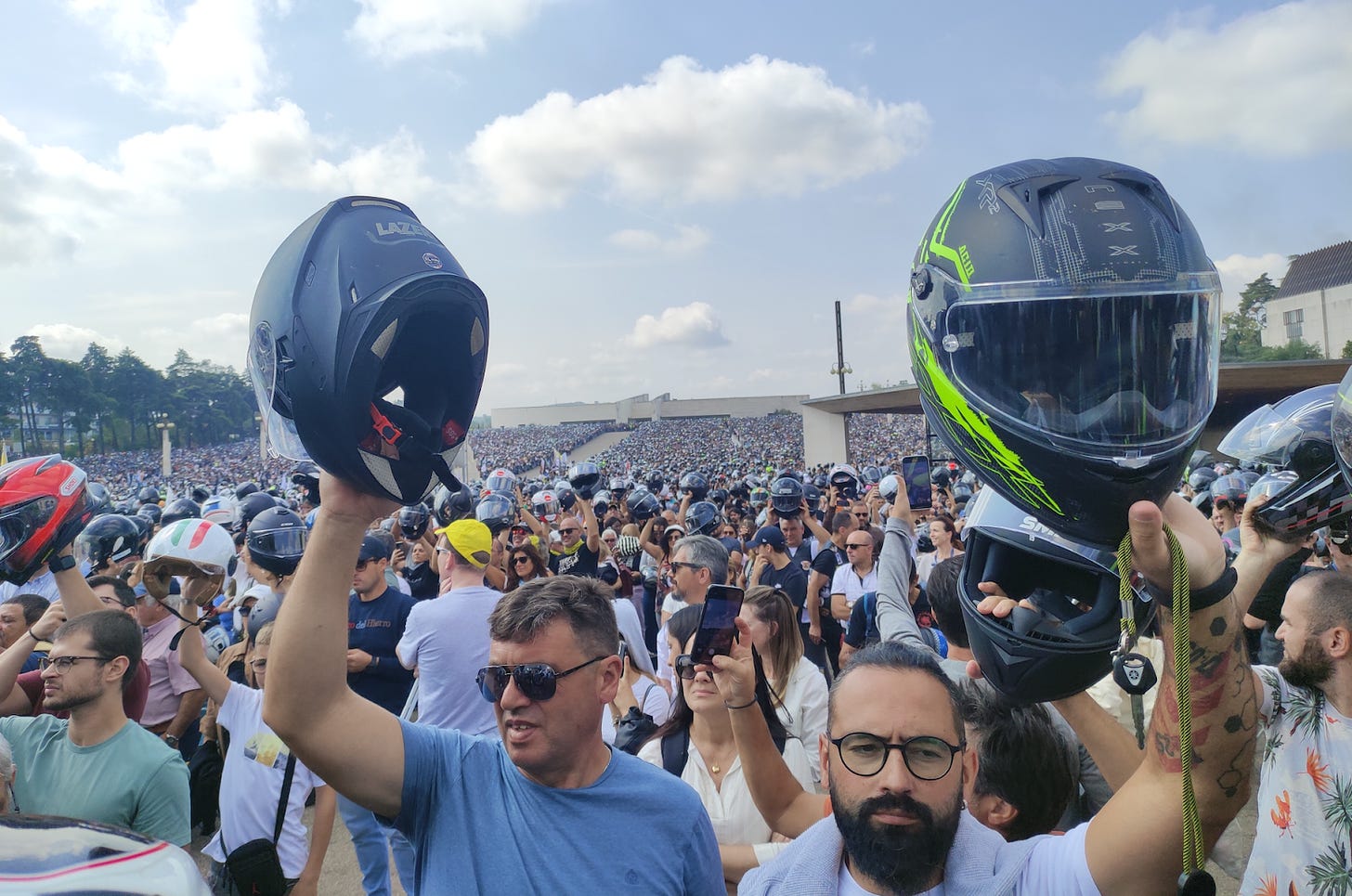
The machines range from very large to pretty small; some are classics, and some are brand new. As they arrive, so do thousands of men and women, many clad in leather or jean vests — they’re “cuts,” in biker jargon — emblazoned with the logos — “patches” — of an enormous variety of motorcycle clubs.
The bikers laugh, greet and hug each other, and try to make themselves heard over the roar of engines.
So why has The Pillar sent me to what appears to be a biker rally in a small town in central Portugal?
Here’s why. This isn’t a motorcycle rally, exactly. It’s a pilgrimage. And the small town where I’m standing happens to be Fátima, one of the most important Catholic shrines in the world.
I am here to experience Fátima’s annual Blessing of the Helmets, held Sept. 22 this year, under the motto: “We are shaped and fashioned by what we love,” a quote from Goethe.
I haven’t even left the parking lot – one of several that will be packed full of bikes – and I am already overwhelmed.
My first contact with the biker-pilgrims occurs at a gas station along the A1 highway, just before the Fátima exit.
Fernando Silva and the other 24 members of the Os Lusitanos Motorcycle Club are getting ready for the last few minutes of their journey, passing around shots of port wine, when I ask them how they might describe the Fátima gathering.
“This is a pilgrimage; it has nothing to do with a rally. [Motorcycle] rallies are just for socializing and enjoying ourselves. This is a gathering of friends, but also a pilgrimage, even though many of us are not Catholics, or practicing,” he tells me.
Silva’s “cut” —his vest — is decorated with patches of Fátima, of St. Raphael, the patron of motorcyclists, and with a small decade of the rosary. There is also a patch that says: “Hot women, cold beer and fast motorcycles.”
On the way back to my car I stop to chat to Bruno and Carla. Bruno works as a security guard, and says riding his bike is a way to let off steam. But Carla insists that she and Bruno are on their way to Fátima for reasons of faith.
“It’s the blessing itself. Those of us who are on the road understand that we are driven by something. Call it God, Mary, or Buddha … I call it faith.”
Once in Fátima, but still in the parking lot, I spot two young men, helmets in hand, gaping widemouthed at the growing crowd. One of them, Rafael, is from Brazil. He is Catholic, and actually lives in Fátima, but this is the first time he’s attending the helmet blessing.
“This is beautiful,” he says. “I’m really enjoying it, I’m speechless.”
Rafael rides a Kawasaki Z750, an impressive bike which completely dwarfs the very small motorcycle parked next to it: a 1982 FAMEL XF-17 with a little 50cc engine.
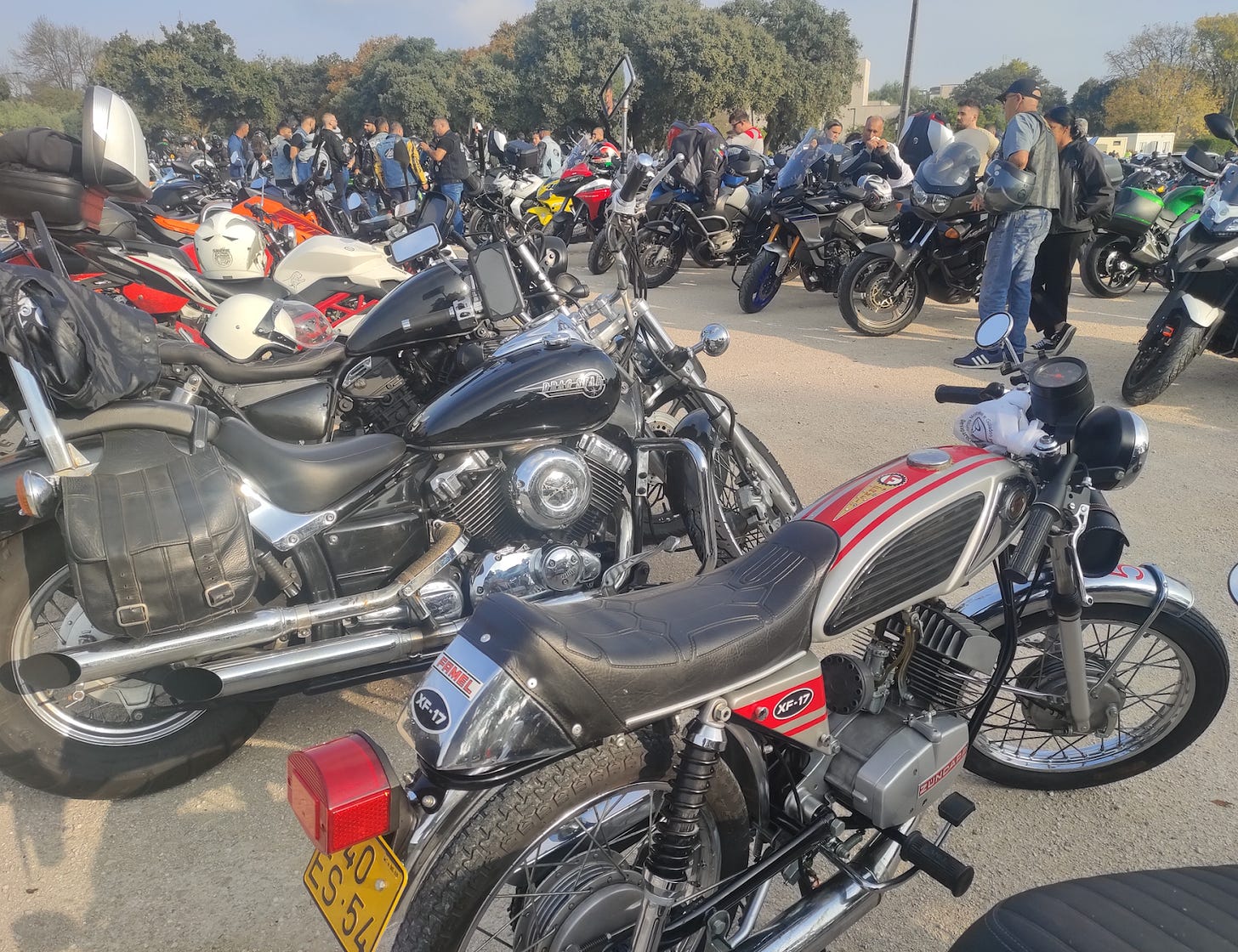
Once Portugal’s most sold motorcycle, the FAMEL has become part of the country’s national imagination: from being a convenient commuter ride, it is now a nationally loved vintage symbol.
Vítor Cruz inherited his FAMEL from his father, and keeps it in mint condition.
Still, on that bike, it took him around 11 hours to drive the 155 miles from Penafiel, in the north, to Fátima.
“We drive for one hour, and stop for 30 minutes, to refuel the bike and ourselves,” Cruz says, laughing.
“I am a Catholic, so the main reason I am here is because of my faith in Our Lady, as well as the challenge of getting this motorcycle down here, which is a miracle in itself!”
As we talk, an elderly man parks a classic 70-year-old Jawa – a Czechoslovakian brand – near us.
João Benedito tells me this is the third time he comes to the Blessing of the Helmets, and that for him, the day is about much more than just hanging out with fellow motorcycle enthusiasts.
“I am a believer, and I ride my motorcycle all year long. Even though I am very careful, that doesn’t mean I am immune to accidents. So I am here to thank God for keeping me safe.”
I ask Benedito what he thinks about the attendees at the blessing — the fact that most of those present are probably not practicing Catholics, and may just be along for the ride, so to speak.
He shrugs it off. “I don’t mind that at all. And who knows, maybe something will click, and next year they won’t just come for the fun and socializing!”
Carlos Pereira, who rides a Honda Goldwing, is head of the Blessing of the Helmets Association, which organizes the event every year.
Pereira concedes that many of the bikers present are not moved to attend by spiritual aims.
“In 2019 we had 160,000 bikers here in Fátima. Were they all practicing Catholics? Of course not. Many of them just come for the gathering itself, out of friendship, and then after the Mass they all go out to lunch,” he explains.
Ezequiel Sá fits that mold. He and his fellow members of the Asas ao Peito Motorcycle Club are united by a love of motorcycles — but also by a shared history in the elite paratroopers’ assault force, which explains their use of green berets.
“I’m not that big on religion,” he tells me, “though that doesn’t mean I don’t respect it.”
“I see this more as a gathering of like-minded people,”Sá adds.
Despite his own lack of enthusiasm for religion, Sá admits that there are all sorts of opinions on the subject among his group. Then he mentions the general diversity g that “our oldest member is 74 – he was jumping out of airplanes before I was even born – and he still rolls with us.”
—
Organizers of the Fátima helmet blessing event have been very careful not to let it morph into just another biker rally.
“Every year we are contacted by people who want to set up stands to sell merchandise, or food, and we always say no. The only merchandise we sell is our own, and all of the proceeds go to charity. This year we are collecting to buy a wheelchair for Marco Vitorino, a 22-year-old biker who had an accident and lost the use of his limbs,” Carlos Pereira tells The Pillar.
Fr. Carlos Cabecinhas, the rector of the Fátima shrine, believes that the annual event is a way of fulfilling Pope Francis’ appeal to spread the Gospel to those who would not normally be found in a Church setting.
“It is definitely a way of reaching out to the peripheries, but it is also way of overcoming prejudices that often hang over a group that we have always had a great working relationship with,” the priest says, stressing that the event has never been marred by violence or other disruptions, despite the stereotypes about bikers in Portugal.
To organize the event, the Blessing of the Helmets Association invites 10 different motorcycle clubs each year to send representatives to a planning committee.
Ricardo Salvador, president of the Matuzas club, says it is a privilege to have been chosen, though he admits that it is a lot of work.
“We are expecting anywhere between 70,000 and 100,000 people,” he tells me, “but everything is going smoothly so far, as it has in other years.”
This year, for the first time, a non-Portuguese club has been invited to be part of the organization as well.
The Moteros de Hoy are from Badajoz, Spain — just across the border from Portugal.
Club president Toni Marquez stresses that “it’s an honor and privilege to be able to share in this experience.”
Being part of the planning, the Moteros de Hoy traveled to Fátima well ahead of the event. And they took their time to get there.
The normally two-and-a-half-hour trip took seven hours, Marquez explains, “because there are a lot of bars on the way.”
But — despite the bars — the group arrived in time to participate in a traditional candlelight procession the night before the blessing.
“It was very impressive,” Marquez tells me.
The variety of flags and patches on display is fascinating. I notice one group named after Saint Augustine, whose patch shows a radical looking Augustinian monk sitting on a motorcycle.
I expect the group to tell me that St. Augustine is the name of the town or village they come from.
But I am way off.
“Our parish is served by Augustinian friars, so that is where we got the name. We are Christian bikers, Catholics,” says Patacas, the group’s president.
“We are a parish group, and we take part in all the parish activities, from charity events to festivities, Masses and processions,” he explains further, adding that many of the priests who have served the parish have been bikers, and become club members.
You would think I might learn from my mistaken assumption about the patch. But when I enter the Fátima shrine itself, I walk into the same trap.
Spotting a group of men sporting a devilish patch — emblazoned with “Diabos de Samuel” and sporting a motorcycle-riding demon — I assume this group must not be very religious.
But the men tell me that they didn’t spontaneously combust when they entered holy ground.
In fact, the name of their club is also church-related.
“We are from the town of Samuel, and our local church is famous for an image, in one of its side-chapels, of St. Michael defeating the devil, and lifting souls out of hell,” one man explains.
“But the image of the devil is so impressive that the church became known informally as ‘Church of the Devil,’ and the whole surrounding region as ‘Devil country.’”
I thought they might be pulling my leg. But incredibly, it is all true. I checked it out.
—
Fátima is part of the Diocese of Leiria, headed by Bishop José Ornelas, who was once a Dehonian missionary priest. When he was young, the bishop himself was a keen motorcyclist.
By telephone, Ornelas tells The Pillar that he would love to attend the blessing one day, but was unable to make the 2024 event.
But Ornelas is full of praise for the event: “Fátima is a place of encounter and of pilgrimage, and motorcycling is a form of pilgrimage as well. In this case, it is a meeting place for people who normally would probably not be there, but the same applies to many others who walk, cycle, or drive.”
In his absence, the Blessing of the Helmets is presided over for the third consecutive year by the Patriarch of Lisbon, Cardinal Rui Valério.
The patriarch’s presence makes sense, since he previously led Portugal’s military and police ordinariate — and police forces in the country make a point of sending delegations to the event.
But in response to a question from The Pillar, Cardinal Valerio makes clear that he has other reasons to be there as well.
“I have six cousins here today”, he explains, before embarking on an exposition about the spiritual dimension of motorcycling.
“When a biker drives for miles and miles, meeting so many different people, he always has a goal, a destination in mind. Slowly, he begins to understand that such is life: It is a road, a voyage, a constant pilgrimage, but on the horizon, rather than a place, there is a person.”
“For a biker there are no distances, and it is the same with humans in relation to God. No matter how difficult it may be, He is never so far away that we cannot set off to meet Him.”
Finally, he says, the solidarity among bikers is an example for society. “When we are on the road and we see three or four helmets laid on the floor [an international sign of distress among bikers] we immediately feel a sense of very deep solidarity, a communion which becomes compassion, the sharing of challenges and sufferings.”
Fr. Ricardo Esteves, from the Diocese of Viana do Castelo, in northern Portugal, rides a Ducati.
At a press conference, he agrees with Patriarch Valério’s identification of a spiritual dimension to motorcycling. “I see my motorcycle as a place of refuge. Sometimes when you are out in the open road it is also a form of introspection, of thinking about your life.”
“There is also an element of learning to let go of everything that is not essential. Like Jesus said, we can only take what we really need for the journey, and when we prepare for a longer trip it makes us think about what is really essential for our life,” the young priest says, explaining that he often attends rallies and is a member of his local bikers’ club.
—
By late morning, the shrine is already starting to fill up.
In 2023, according to organizers, it rained non-stop all day, and even so, 70,000 bikers came. Today it is sunny, so a good turnout is expected.
I chat with the head of Amigos da Picada, a group of Angolan bikers living in Portugal, and with a member of the Red Knights, an international motorcycle club for firefighters, and soon it is time for the Mass to begin.
The opening procession winds out of the Chapel of the Apparitions to the altar, facing out over the massive shrine grounds.
A platform bearing the image of Our Lady of Fátima is carried by bikers chosen from among the 10 organizing clubs.
Usually at Fátima, six people – often students from the national military academy, or members of the armed forces – carry the image to the altar, and back at the end.
But in past years, the bikers were so eager to have that privilege that the shrine made an exception to its custom, and now allows two groups of six to carry the platform halfway each, and another two groups to carry it back, so that a total of 24 bikers get to participate.
“This year, during one of the meetings of the organizing committee we had the president of a club in tears because he wanted to carry the platform, and last year one of them had to be helped by the emergency services when he arrived at the altar, because he was overcome with emotion, and collapsed,” Carlos Pereira tells me.
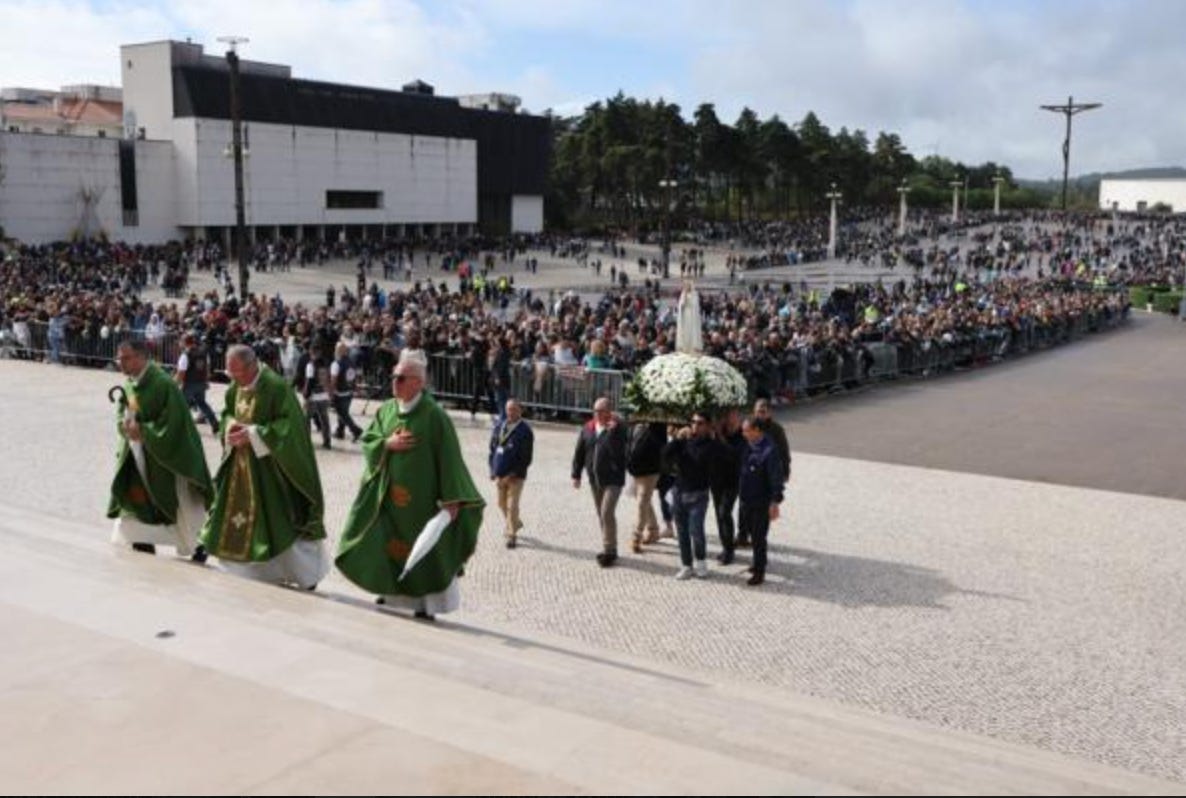
Mass begins, and though the atmosphere is respectful, it becomes quite clear from the low volume of responses and general posture that most of those present are not habitual Mass-goers.
At communion, volunteers accompany the priests and extraordinary ministers of communion, holding white umbrellas to signal their position among the crowd, but compared to other pilgrimages I have attended in Fátima, relatively few people receive the Eucharist.
There are exceptions, though. Pedro and Susana, standing just in front of me, are wearing vests with a patch of a cross, from a club called “Abençoados” — “Blessed.”
They are reverent and deeply moved by the Mass.
So what do they think of the fact that most people around us don’t seem to know what is going on?
“I try not to judge,” says Susana. “I’m glad they’re all here, it is always worth coming. Even if you are not a Catholic, there is something special about Fátima, nobody is immune to that.”
And the truth is that I cannot help feeling impressed when I look around and see that the ground is completely packed with people, the vast majority of whom are bikers, eagerly awaiting the blessing itself.
Official numbers provided by the shrine will later confirm my hunch that the previous record has been beaten, with 180,000 bikers attending the Blessing of the Helmets.
“I know that other shrines have motorcycle pilgrimages, but it’s usually a few dozen, or a few hundred people,” Fr Carlos Cabecinhas had told me. “I am not aware of any shrine, at least in Europe, that has something as big as this.”
When the time for the blessing arrives, the sight is more impressive still, as all those 180,000 people hold their helmets aloft and priests walk up and down sprinkling holy water on the crowd.
On the front steps of the shrine, leading up to the altar, a line is formed by bikers from the different branches of the police, including two visiting members of the Spanish traffic police.
All those cops make this an unusual motorcycle event — The Blessing of the Helmets brings together bikers and law enforcement in a peaceful and collaborative atmosphere, while at ordinary rallies the police are often treated with suspicion.
As the priests pass by, many people are unable to hide their emotion, with some checking to see if any of the holy water landed on their helmets. For many of the pilgrims, that sprinkling rite is why they traveled far. From the looks on their faces, and the way they embrace each other, none seem to regret the journey.
At the end of Mass, the procession heads back to the Chapel of the Apparitions.
Two processing priests are carrying helmets of their own, and the chapel’ rector, Fr Carlos Cabecinhas is wearing a decoration that has just been given to him by the commander of the National Republican Guard, a militarized police force, in recognition of Fátima’s role in promoting road safety over the years.
Every year there are thousands of accidents involving motorcycles on Portuguese roads. More than one hundred people died in 2023, with many others left permanently injured. Aware of that, the Blessing of the Helmets Association promotes awareness videos and holds a road safety forum every year.
The image of Our Lady of Fátima is returned to the sacristy. I notice that at least two of the bikers who carried it have tears streaming down their faces.
One of them is Joaquim, from the Spanish club from Badajoz, who describes the moment as “a huge privilege, and a once-in-a-lifetime opportunity,” while assuring The Pillar that his group will be back next year.
While most of the bikers leave the shrine grounds for a ride around town or to find some lunch, some join the large queue to offer votive candles before an apparition image.
That is where I catch up with Manuel, a young biker who came with his son William, from near Lisbon.
Manuel says that from a young age he learned that “it is important to get blessings. Since we’re bikers, and this is the Blessing of the Helmets, I brought my family to get blessed today.”
Finally, before leaving the shrine I run into two American tourists who stand out from the rest of the crowd.
Marty and George, from New Jersey and North Carolina respectively, are visiting Portugal with their wives and planned their trip to Fátima this Sunday, unaware that they would be in the company of 180,000 bikers.
“It’s astounding how many people showed up for an event like this,” says Marty.
George adds, cautiously, that “in America this is not a group you would think would go to church. For us, it tells us something about the culture here, that it is supportive and accepting.”
As I get back into my car, I can barely hear myself think over the sound of revving engines and honking as thousands of bikers stream along the road that leads into the town center.
I wait patiently for a policeman, directing traffic under the oppressive heat, to motion me into the slow-moving lane, and watch as a tough-looking biker, complete with a long beard, crosses the road towards the officer, who tracks his movements rather suspiciously.
Smiling, the biker offers him a bottle of cold water and gives him a friendly pat on the back, thanking him for his hard work, before heading back to the side of the road.

